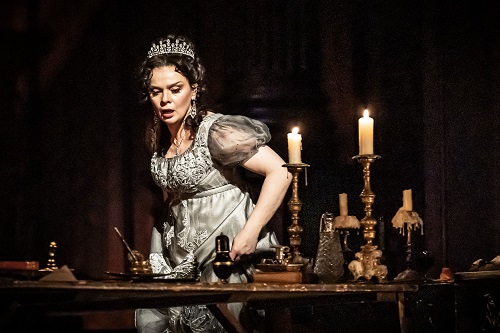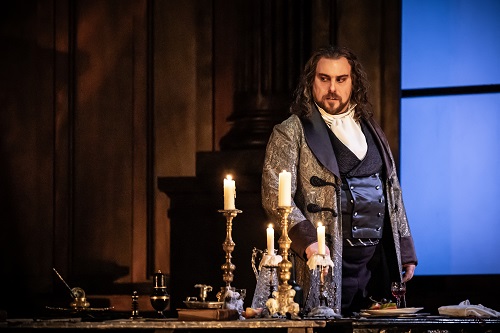For a successful theatre production to work well, Puccini once asserted, there were three fixed laws. He claimed these should be a necessity ‘to interest, to surprise, to move’. This umpteenth revival of Jonathan Kent’s Tosca, originally unveiled in 2006, fulfilled the composer’s requirements, but not necessarily in a way I expected. Yes, my interest was sustained across the work’s three acts, but more to see if the chemistry between the central characters would ripen, and whether there would be any wow factor from them vocally. One might not anticipate any surprises with a revival, especially when one has reached double figures, but here I was taken aback by the absence of dramatic tension both on and off stage. Those opening chords from the orchestra (marked triple forte) made little impact – its tragic import muted. So, was I moved anywhere? Act 3 always brings a moistening of the eyes, and the simplicity of the Shepherd’s song (Madeleine McGhee) was beautifully done, and a luminous cello quartet was particularly fine.

This production has almost become a museum piece, but my wish to see it again (my third time) was prompted, in part, by the chance of hearing a new trio of principals, and a desire to reacquaint myself with the splendid fresco of Mary Magdalen and the magnificence of Scarpia’s book-lined apartment in the Palazzo Farnese. Both still ravish the eye. Overall, however, this revival was a limp affair with no standout performances, singing never quite rising above the ordinary. On the plus side, Aušrinė Stundytė (who had made her Covent Garden debut recently in the title role of Elektra) is more than capable of creating a believable character. Her Tosca, while no diva, was variously coy, coquettish and comic, the latter when making repeated requests for Cavaradossi to repaint the eyes of the Madonna. Devout, jealous, insecure and naïve were all well-defined. In short, she was a joy to watch. Her singing was impressive too, if not show stealing, with plenty of intelligence and an easy way of communicating her feelings. A little more power might have been welcome, especially in ‘Vissi d’arte’, here a reined-in performance, but I liked the way she almost choked on her last phrases.

Just a shame the relationship with Marcelo Puente’s Cavaradossi was so one-sided. His portrayal of Cavaradossi will develop in time but has yet to assume any special interest. After a while one can ignore this Argentinian’s fast vibrato, and the lack of real power above the stave. Where some tenors like to show off their ‘money notes’, Puente held his back. ‘Recondita armonia’ was acceptable and drew some polite applause, but his brief victory celebration in Act 2 was not the expected passionate outburst that could have been an emotional high point. Likewise, ‘E lucevan le stelle’ didn’t quite raise the emotional temperature. Chemistry fared better between Stundytė and Gabriele Viviani’s rich-toned Scarpia. No pantomime villain here, but a stage presence combining suavity and malevolence, the latter more pronounced in his Act 1 exchanges with Tosca than in Act 2 where the physical distance separating them reduced tensions. That said, there was no denying the unpleasantness of Viviani’s line ‘there’s more spice to violent conquest than sweet consent’.
Amongst the minor characters Henry Waddington was in fine fettle as the Sacristan, Grisha Martirosyan stood out as the luckless fugitive Angelotti and Didier Pieri was suitably disturbing as Spoletta. Madeleine McGhee was a breath of fresh air as the Shepherd-boy. Both the Royal Opera Chorus and pupils from Trinity School (Croydon) provided splendidly robust singing and, in the pit, Karen Kamensek drew some accomplished playing, her tempi fluid, but too often ensuring a low-key orchestral presence. In Act 3 the players were almost overwhelmed by the clamour of church bells. Perhaps in time this Tosca will leave a more memorable impression as orchestral balance improves and relationships between the main characters develop and find deeper resonances.
David Truslove
Puccini: Tosca
Floria Tosca – Aušrinė Stundytė, Cavaradossi – Marcelo Puente, Scarpia – Gabriele Viviani, Sacristan – Henry Waddington, Angelotti – Grisha Martirosyan, Spoletta – Didier Pieri, Sciarrone – Jamie Woollard, Jailer – Oller Setterstrom, Shepherd-boy – Madeleine McGhee; Director – Jonathan Kent, Revival Director – Lucy Bradley, Conductor – Karen Kamensek, Designer – Paul Brown, Lighting design – Mark Henderson, Chorus & Orchestra of the Royal Opera House.
The Royal Opera House, London; Monday 5th February 2024.